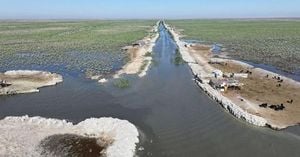UK fisheries are at the center of controversy as tensions rise between the United Kingdom and the European Union over the fishing ban on sandeels, small yet ecologically significant fish found primarily in the North Sea. The conflict peaked after the UK government instituted this ban last April, aiming to protect depleting stocks and improve marine health amid concerns over ecological integrity.
The EU, particularly Denmark which relies heavily on sandeels for its fishing industry, has voiced strong opposition to the UK’s decision. Sandeels are often dried and crushed to produce fish oil and fish meal for farmed fish, and Denmark’s annual catch of approximately 250,000 tonnes equates to several billion individual fish worth around £40 million. This aspect of fishing is not merely economic; it raises alarms about the broader ecological repercussions when marine food chains are disrupted.
During recent hearings at the Permanent Court of Justice, UK representatives emphasized the necessity of preserving sandeels, stressing their integral role within the marine ecosystem. Ben Juratowitch argued, "Urgent action is required to protect stocks and the wider ecosystem from increasing pressures," defending the ban as central to London’s efforts to achieve Good Environmental Status (GES) for the North Sea.
Critics of the EU's challenge highlight the environmental ramifications of disregarding the ban. Hugo Tagholm, Executive Director of Oceana UK, stated, "It is a deep betrayal of our shared seas..." reinforcing the idea sandeels are not just fish; they are foundational to the survival of numerous marine species, including endangered seabirds like puffins and kittiwakes.
With many UK seabird populations already declining, every opportunity to mitigate food shortages is pivotal. Puffins, for example, face unprecedented challenges, with some reportedly traveling up to 250 kilometers to source food due to dwindling sandeel populations. The plight of these seabirds raises questions about the long-term effects of fishing practices and the pressure exerted by industries focused on short-term gains.
While addressing fisheries management, the UK government recently outlined its Marine Strategy Part Three: 2025 Programme of Measures. This comprehensive initiative aims to bolster fisheries management and provide enhanced protections for cetaceans — including dolphins and porpoises — which also suffer from fishing practices and climate change impacts. The strategy includes significant provisions such as obligations under the Fisheries Act 2020 to manage stocks sustainably and explore the development of Marine Protected Areas (MPA).
Measures to reduce bycatch — the incidental capture of non-target marine species— are also central to the government’s plan. The establishment of initiatives like the Clean Catch UK Bycatch Mitigation Hub aims to promote practices among fishers minimizing harm to sensitive species, ensuring both environmental protection and sustainable fishing practices.
Yet, as the UK navigates the challenges posed by international fishing agreements and climate change, experts acknowledge the need for cooperative approaches with the EU and other nations. The efficacy of the Marine Strategy relies heavily on compliance and enforcement, recognizing, as Juratowitch articulated, "The starting point is... no right to go..." highlighting the legal and ethical dimensions of harvesting living resources from shared waters.
Looking toward the future, the outcomes of the arbitration case and the effectiveness of the Marine Strategy will be closely monitored. Fishing industry representatives have welcomed the government’s commitment to science-based management, albeit with reservations about potential restrictions impacting coastal communities economically dependent on fishing. Conservationists, meanwhile, have cautiously welcomed the cetacean protection measures, advocating for stricter regulations on industrial fleets to safeguard vulnerable species.
Culminatively, the struggles over sandeel fishing encapsulate the broader conversation on sustainability and environmental stewardship within UK waters. The response to these issues will be pivotal not just for the immediate economics of fishing but for marine biodiversity as well. Ensuring both fish stocks and marine mammals thrive will require dedication to cooperative strategies and innovative approaches to conservation — poignantly necessary amid the increasing pressures of climate variability and human activity on ocean ecosystems.



